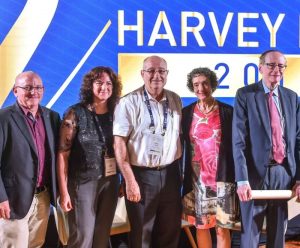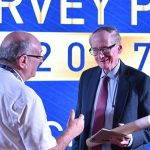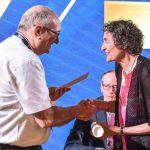Harvey Prize Ceremony
Prof. Carla J. Shatz and Prof. Tobin J. Marks received the 2017 Harvey Prize at a festive ceremony at Technion honoring the two outstanding scientists
The prestigious Harvey Prize was conferred upon two highly distinguished scientists, Prof. Carla J. Shatz and Prof. Tobin J. Marks, at a ceremony at Technion on Sunday, June 10th.

From left to right: Professor Wayne D. Kaplan Technion Executive Vice President for Research, Professor Hagit Attiya Technion Executive Vice President for Academic Affairs, Technion President Prof. Peretz ,Prof. Shatz and Prof. Marks
The Harvey Prize has been awarded by Technion each year since 1971 to outstanding individuals in the fields of science and technology. The prize, which was established by the late Leo M. Harvey of Los Angeles, is awarded to trailblazing scholars and scientists from around the world irrespective of nationality, race, religion or gender.
At this year’s ceremony, which took place during Technion’s annual Board of Governors meeting, Profs. Shatz and Marks received the prize from Technion President Prof. Peretz Lavie. Prof. Lavie described the two laureates as “being blessed with creativity” and told the audience that this year’s winners conformed to the high standards set by previous Harvey Prize recipients in that they “have made breakthroughs in science and technology that truly contribute to the progress of humanity.”
Prof. Tobin Marks is a professor of Materials Science and Engineering, Applied Physics, Chemical and Biological Engineering at Northwestern University, Illinois, USA. He received the Harvey Prize “in recognition of his groundbreaking research in the areas of catalysis, organo-f-element chemistry, electronic and photonic materials, and coordination chemistry, which have strongly impacted contemporary science.” Prof. Marks has published 1,260 peer-reviewed articles and holds 265 U.S. patents.
Prof. Marks professed to being deeply honored by the Harvey Prize, especially given the fact that former winners were so illustrious. In fact, several of them later received a Nobel Prize. Addressing the audience, Prof. Marks said that he was especially thrilled to accept the Harvey Prize given the close connection between Israel and the world of Chemistry. He cited both Fritz Haber, the Nobel Prize winning chemist who died on his way to Mandatory Palestine in 1934, and Chaim Weizmann, the Zionist leader who was also a world-renowned chemist, and asserted that, “the success of this nation has close connections to Chemistry.”
Marks also reminisced about his first trip to Israel in 1986, when he spent a month as a young lecturer at Technion. “That visit was transformative. It’s amazing how the country has changed. At the time, the ‘Start-Up Nation’ mainly referred to trying to start up all the old cars people had. Since then, I have felt a strong bond between myself and Israel.”
The second honoree, Prof. Carla J. Shatz, is a professor of Biology and Neurobiology at Stanford University, California, USA. She has devoted her extensive research career to understanding the interplay between genes and environment that shapes brain circuits. Among other achievements, her studies of the visual system have influenced neuroscience research and human health. She was awarded the Harvey Prize “in recognition of her discoveries concerning the emergence and function of brain circuits for vision,” and the therapeutic implications of her findings on the treatment of memory loss.
Upon receiving the prize, Prof. Shatz stressed that she “wouldn’t be here today if it weren’t for the support of so many people.” In particular, she thanked her parents, who taught her “to think independently,” and her ‘scientific parents,’ the Nobel Prize laureates at Harvard who invited her to join their lab at a time when there were few women in the field. “Thanks to them, I learned the joy, excitement and fun of Science,” she insisted. Prof. Shatz also reminisced about her late grandmother, who experienced a stroke 50 years ago and who is largely responsible for her interest in neuroscience.
“There were many amazing developments in the last century,” Prof. Shatz concluded, “and now we are facing the ultimate challenge – how do we synthesize everything we have deconstructed? New synergies must be created by all disciplines. There’s still so much to discover.”




